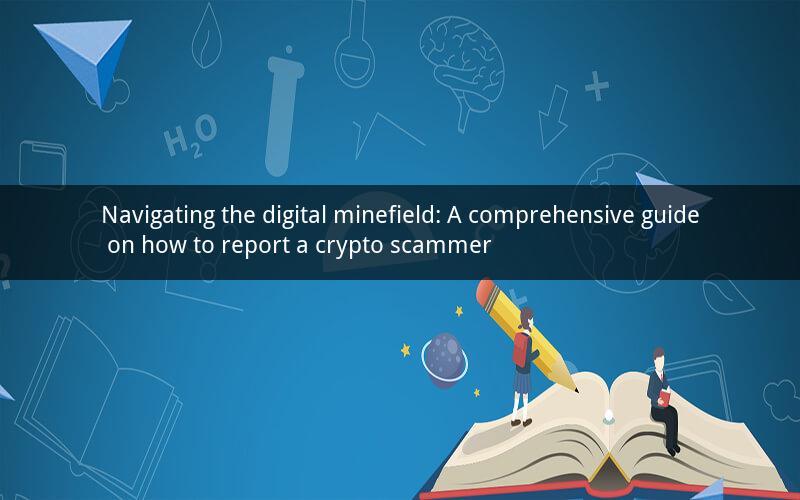
In the age of cryptocurrencies, scams have become increasingly prevalent. The allure of high returns and the anonymity of digital currencies have attracted numerous malicious actors looking to exploit unsuspecting individuals. If you've become a victim of a crypto scammer, it's crucial to take immediate action to report the crime. This article delves into the ins and outs of reporting a crypto scammer, providing valuable insights into the process and ensuring that the right authorities are informed.
Understanding the nature of crypto scams
Crypto scams are fraudulent activities designed to exploit individuals' trust in cryptocurrencies. These scams can come in various forms, such as phishing, Ponzi schemes, fake exchanges, and wallet theft. It's essential to recognize the signs of a crypto scam to protect yourself and others.
1. Phishing: Scammers use deceptive emails, messages, or websites that mimic legitimate platforms to steal personal information or funds.
2. Ponzi schemes: These involve promising high returns for investing in a cryptocurrency, but the scheme collapses when there are no new investors.
3. Fake exchanges: Scammers set up fraudulent cryptocurrency exchanges to steal funds during transactions.
4. Wallet theft: Scammers obtain access to your private keys and steal your cryptocurrency.
The importance of reporting crypto scams
Reporting crypto scams is vital for several reasons:
1. Protect yourself: Reporting the scam can prevent you from falling victim to the same scheme again.
2. Protect others: Informing authorities can help prevent others from falling prey to the same scammer.
3. Aid in investigation: Law enforcement agencies rely on reports from victims to investigate and bring scammers to justice.
4. Disrupt criminal operations: Reporting scams can help dismantle criminal networks and prevent future victims.
Steps to report a crypto scammer
Here's a step-by-step guide on how to report a crypto scammer:
1. Gather evidence: Collect any relevant information, such as emails, messages, screenshots, and transaction details. This evidence will be crucial when reporting the scam.
2. Identify the scammer: Determine the scammer's identity, if possible. This could include their username, email address, or any other identifying information.
3. Contact the appropriate authorities: Depending on your location, there are various agencies to report a crypto scam. These may include:
a. Local law enforcement: Contact your local police department to file a report.
b. Cybercrime units: Some countries have dedicated cybercrime units that handle crypto scams.
c. Financial institutions: If the scam involves a bank or financial institution, contact them directly.
d. Cryptocurrency exchanges: If the scam occurred on an exchange, report it to the platform.
4. File a complaint with an international organization: If the scammer operates across borders, consider filing a complaint with an international organization such as the Internet Crime Complaint Center (IC3) or Europol's Cybercrime Centre.
5. Follow up: Keep in touch with the authorities to ensure your report is being addressed.
Common challenges in reporting crypto scams
Reporting a crypto scam can be challenging for several reasons:
1. Anonymity: Scammers often operate under pseudonyms or use anonymous platforms, making it difficult to identify them.
2. Jurisdictional issues: Crypto scams often span multiple countries, complicating the process of reporting and investigation.
3. Lack of awareness: Many victims are unaware of the appropriate authorities to report a scam.
4. Limited resources: Law enforcement agencies may lack the resources to investigate crypto scams effectively.
What to do if you're unable to report the scam
If you're unable to report the scam due to any of the challenges mentioned above, consider the following alternatives:
1. Share your experience: Inform friends, family, and social media about the scam to help raise awareness and prevent others from falling victim.
2. Create a support group: Connect with other victims to share information and resources.
3. Write a blog or article: Use your personal experience to educate others about crypto scams and how to avoid them.
4. Support advocacy groups: Join or donate to organizations that fight against cybercrime and crypto scams.
Frequently asked questions (FAQs)
1. Q: Can I report a crypto scammer anonymously?
A: It depends on the reporting channel. Some organizations allow you to file a complaint without providing personal information, while others require your identity for legal purposes.
2. Q: What happens after I report a crypto scammer?
A: Law enforcement agencies will review your report and take appropriate action, which may include investigating the scammer, freezing assets, or assisting victims.
3. Q: Can I recover my stolen funds?
A: Reclaiming stolen funds can be challenging, as cryptocurrencies are designed to be decentralized and irreversible. However, some organizations specialize in tracing and recovering stolen funds.
4. Q: Should I report a minor scam?
A: Yes, even minor scams are important to report, as they contribute to the overall prevalence of fraudulent activities. Reporting can help prevent scammers from targeting more individuals.
5. Q: How can I protect myself from future crypto scams?
A: Stay informed about the latest scams, verify the authenticity of platforms and individuals, and never invest in opportunities that seem too good to be true.
In conclusion, reporting a crypto scammer is a crucial step in preventing further exploitation and aiding law enforcement in their efforts to bring scammers to justice. By understanding the process, gathering evidence, and contacting the appropriate authorities, you can make a significant impact in the fight against crypto scams.